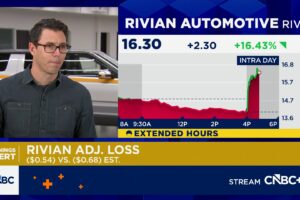Rick Osterloh, Senior Vice President of Devices and Services announced last week that Alphabet GOOGL was in a definitive agreement with Fitbit to acquire the company. It was later ascertained that it was dishing out $7.35 a share or $2.1 billion.
So why on earth would Alphabet want to acquire a company, which is struggling to compete with giant market leader Apple AAPL. Fitbit was a pioneer in the space and market leader for a long time and people liked it for its simplicity and privacy. Then along came Apple with a more complex “smartwatch” that it was able to quickly popularize, especially amongst its captive user base.
Apple has no real competition here, commanding nearly 50% market share on the strength of its ownership of all the building blocks necessary in both hardware and software. It also knows its customers well enough to bring artificial intelligence (AI) into the mix.
A distant second in the space is Fitbit FIT, followed by other players like Samsung, Fossil, LG, and so on. Consolidation started after Apple entered the space because it was obvious that none of the companies making the market had its deep intellectual property or its equally deep pockets. The only player that could have made a difference was Samsung, but the attempt to focus on its own Tizen OS spoilt things.
<p class="canvas-atom canvas-text Mb(1.0em) Mb(0)–sm Mt(0.8em)–sm" type="text" content="How Could Alphabet Change Things?” data-reactid=”15″>How Could Alphabet Change Things?
Alphabet is another very deep-pocketed player, one of the very few that can actually stand up to Apple. The company is also deeply invested in artificial intelligence. So Fitbit with its 28 million users worth of data is a very good fit. Also, Fitbit gets a big brother that can help it reach many more users.
The wearables revolution, at least as far as the wrist band category is concerned, is currently being driven by health tracking. So in order to differentiate, you need to offer not just the hardwar and software chops that Google is acquiring but also the scale and AI power that Fitbit lacked.
True that Fitbit owners may not be thrilled today, but my guess is that story will change when their devices become much more useful. Alphabet’s Google has the technological platform (Android, smartphone, chromecast, smart display, Nest devices) that when added to Fitbit’s range (activity trackers, smartwatches, wireless headphones, smart scales) likely covers the full range of devices consumes are likely to use through the day. So Google Assistant can work across devices for a very personalized experience.
Also, between them, Alphabet and Fitbit will now include technology from Pebble (which Fitbit acquired), Misfit (which first Fossil acquired and then Google bought from it), Fossil (which is partnered with Google on technology that isn’t yet public). So the deal will result in suitable competition for Apple.
Moreover, and as speculated by many, Alphabet will very likely use Fitbit technology in its own Pixel line of devices. In Devices and Services SVP Rick Osterloh’s words, this is “an opportunity to invest even more in Wear OS as well as introduce Made by Google wearable devices into the market.”
<p class="canvas-atom canvas-text Mb(1.0em) Mb(0)–sm Mt(0.8em)–sm" type="text" content="The Antitrust Issue” data-reactid=”21″>The Antitrust Issue
Google is currently under investigation by regulatory authorities in the U.S. and the EU and has also been fined by regulators in both regions. The data it has managed to collect on users across the world (except China) is unparalleled except perhaps by Facebook FB. So an acquisition that hands it even more data likely won’t go down well with anyone.
<p class="canvas-atom canvas-text Mb(1.0em) Mb(0)–sm Mt(0.8em)–sm" type="text" content="The Privacy Issue” data-reactid=”23″>The Privacy Issue
And the data we’re talking about is highly sensitive health data that when combined with other data Google already has on people, will leave nothing to imagination. Will Google share this data with prospective employers perhaps, or prospective creditors, or any others who may be interested in additional information on us before they transact with us? Boggles the mind.
Both Fitbit and Alphabet have given reassurances that the data won’t be sold to advertisers, so you won’t see ads based on it. But honestly, there’s still a ton of other uses.
<p class="canvas-atom canvas-text Mb(1.0em) Mb(0)–sm Mt(0.8em)–sm" type="text" content="Wrapping Up” data-reactid=”26″>Wrapping Up
Although regulators in the U.S. and EU have already expressed concerns, it’s hard to see how they can stop the acquisition because it will increase competition in the space. You can’t after all tell people they don’t deserve a good experience simply because they don’t belong to the Apple ecosystem. And no one is talking about breaking up Apple yet.
Somehow, we’ve been convinced by technology companies that it’s a good idea to record our vital signs every second of every day. And to a certain extent, some scary numbers may get more people out of bed and on to the jogging track. They can also increase overall awareness on health issues. However, there’s also the danger that we’ll be tracking ourselves much more than we need to and worrying needlessly. And like it or not, this revolution is only getting started.
<p class="canvas-atom canvas-text Mb(1.0em) Mb(0)–sm Mt(0.8em)–sm" type="text" content="Recommendation” data-reactid=”33″>Recommendation
<p class="canvas-atom canvas-text Mb(1.0em) Mb(0)–sm Mt(0.8em)–sm" type="text" content="Alphabet shares currently carry a Zacks Rank #3 (Hold). You can see the complete list of today’s Zacks #1 Rank (Strong Buy) stocks here.” data-reactid=”34″>Alphabet shares currently carry a Zacks Rank #3 (Hold). You can see the complete list of today’s Zacks #1 Rank (Strong Buy) stocks here.

<p class="canvas-atom canvas-text Mb(1.0em) Mb(0)–sm Mt(0.8em)–sm" type="text" content="Today’s Best Stocks from Zacks” data-reactid=”43″>Today’s Best Stocks from Zacks
Would you like to see the updated picks from our best market-beating strategies? From 2017 through 2018, while the S&P 500 gained +15.8%, five of our screens returned +38.0%, +61.3%, +61.6%, +68.1%, and +98.3%.
This outperformance has not just been a recent phenomenon. From 2000 – 2018, while the S&P averaged +4.8% per year, our top strategies averaged up to +56.2% per year.
<p class="canvas-atom canvas-text Mb(1.0em) Mb(0)–sm Mt(0.8em)–sm" type="text" content="See their latest picks free >>” data-reactid=”46″>See their latest picks free >>
<p class="canvas-atom canvas-text Mb(1.0em) Mb(0)–sm Mt(0.8em)–sm" type="text" content="
Want the latest recommendations from Zacks Investment Research? Today, you can download 7 Best Stocks for the Next 30 Days. Click to get this free report
Facebook, Inc. (FB) : Free Stock Analysis Report
Alphabet Inc. (GOOGL) : Free Stock Analysis Report
Apple Inc. (AAPL) : Free Stock Analysis Report
Fitbit, Inc. (FIT) : Free Stock Analysis Report
To read this article on Zacks.com click here.
Zacks Investment Research” data-reactid=”47″>
Want the latest recommendations from Zacks Investment Research? Today, you can download 7 Best Stocks for the Next 30 Days. Click to get this free report
Facebook, Inc. (FB) : Free Stock Analysis Report
Alphabet Inc. (GOOGL) : Free Stock Analysis Report
Apple Inc. (AAPL) : Free Stock Analysis Report
Fitbit, Inc. (FIT) : Free Stock Analysis Report
To read this article on Zacks.com click here.
Zacks Investment Research







